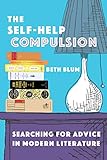The Self-Help Compulsion : Searching for Advice in Modern Literature / Beth Blum.
Material type: TextPublisher: New York, NY : Columbia University Press, [2020]Copyright date: ©2020Description: 1 online resource : 22 b&w illustrationsContent type:
TextPublisher: New York, NY : Columbia University Press, [2020]Copyright date: ©2020Description: 1 online resource : 22 b&w illustrationsContent type: - 9780231194921
- 9780231551083
- 809/.93353 23
- PN3352.P7 B58 2020
- online - DeGruyter
| Item type | Current library | Call number | URL | Status | Notes | Barcode | |
|---|---|---|---|---|---|---|---|
 eBook
eBook
|
Biblioteca "Angelicum" Pont. Univ. S.Tommaso d'Aquino Nuvola online | online - DeGruyter (Browse shelf(Opens below)) | Online access | Not for loan (Accesso limitato) | Accesso per gli utenti autorizzati / Access for authorized users | (dgr)9780231551083 |
Frontmatter -- CONTENTS -- ACKNOWLEDGMENTS -- INTRODUCTION -- 1. Self-Help’s Portable Wisdom -- 2. Bouvard and Pécuchet: Flaubert’s DIY Dystopia -- 3. Negative Visualization -- 4. Joyce for Life -- 5. Modernism Without Tears -- 6. Practicality Hunger -- Coda: The Shadow University of Self-Help -- Notes -- Index
restricted access online access with authorization star
http://purl.org/coar/access_right/c_16ec
Samuel Beckett as a guru for business executives? James Joyce as a guide to living a good life? The notion of notoriously experimental authors sharing a shelf with self-help books might seem far-fetched, yet a hidden history of rivalry, influence, and imitation links these two worlds. In The Self-Help Compulsion, Beth Blum reveals the profound entanglement of modern literature and commercial advice from the late nineteenth century to the present day.Blum explores popular reading practices in which people turn to literature in search of practical advice alongside modern writers’ rebukes of such instrumental purposes. As literary authors positioned themselves in opposition to people like Samuel Smiles and Dale Carnegie, readers turned to self-help for the promises of mobility, agency, and practical use that serious literature was reluctant to supply. Blum unearths a series of unlikely cases of the love-hate relationship between serious fiction and commercial advice, from Gustave Flaubert’s mockery of early DIY culture to Dear Abby’s cutting diagnoses of Nathanael West and from Virginia Woolf’s ambivalent polemics against self-improvement to the ways that contemporary global authors such as Mohsin Hamid and Tash Aw explicitly draw on the self-help genre. She also traces the self-help industry’s tendency to popularize, "e, and adapt literary wisdom and considers what it might have to teach today’s university. Offering a new history of self-help’s origins, appeal, and cultural and literary import around the world, this book reveals that self-help’s most valuable secrets are not about getting rich or winning friends but about how and why people read.
Mode of access: Internet via World Wide Web.
In English.
Description based on online resource; title from PDF title page (publisher's Web site, viewed 27. Jan 2023)


